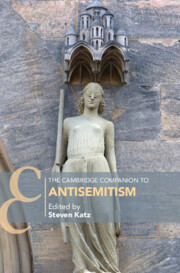Book contents
- The Cambridge Companion to Antisemitism
- Cambridge Companions to Religion
- The Cambridge Companion to Antisemitism
- Copyright page
- Contents
- Contributors
- Acknowledgments
- Introduction
- Part I The Classical Period
- Part II Medieval Times
- Part III The Modern Era
- 15 Martin Luther and the Reformation
- 16 The Enlightenment and Its Negative Consequences
- 17 Modern Antisemitism in Western Europe
- 18 Antisemitism in Late Imperial Russia and Eastern Europe through 1920
- 19 Marxism, Socialism, and Antisemitism
- 20A Antisemitism in Modern Literature and Theater
- 20B Antisemitism in Modern Literature and Theater
- 20C Antisemitism in Modern Literature and Theater
- 21 Antisemitism in America, 1654–2020
- 22 Antisemitism in the Weimar Republic and the Third Reich
- 23 New Islamic Antisemitism, Mid-19th to the 21st Century
- 24 Anti-Zionism as Antisemitism
- 25 New Issues
- 26 Antisemitism in Social Media and on the Web
- 27 Theories on the Causes of Antisemitism
- Appendix The International Holocaust Remembrance Alliance: Working Definition of Antisemitism
- Index
- Cambridge Companions to Religion
- References
18 - Antisemitism in Late Imperial Russia and Eastern Europe through 1920
from Part III - The Modern Era
Published online by Cambridge University Press: 05 May 2022
- The Cambridge Companion to Antisemitism
- Cambridge Companions to Religion
- The Cambridge Companion to Antisemitism
- Copyright page
- Contents
- Contributors
- Acknowledgments
- Introduction
- Part I The Classical Period
- Part II Medieval Times
- Part III The Modern Era
- 15 Martin Luther and the Reformation
- 16 The Enlightenment and Its Negative Consequences
- 17 Modern Antisemitism in Western Europe
- 18 Antisemitism in Late Imperial Russia and Eastern Europe through 1920
- 19 Marxism, Socialism, and Antisemitism
- 20A Antisemitism in Modern Literature and Theater
- 20B Antisemitism in Modern Literature and Theater
- 20C Antisemitism in Modern Literature and Theater
- 21 Antisemitism in America, 1654–2020
- 22 Antisemitism in the Weimar Republic and the Third Reich
- 23 New Islamic Antisemitism, Mid-19th to the 21st Century
- 24 Anti-Zionism as Antisemitism
- 25 New Issues
- 26 Antisemitism in Social Media and on the Web
- 27 Theories on the Causes of Antisemitism
- Appendix The International Holocaust Remembrance Alliance: Working Definition of Antisemitism
- Index
- Cambridge Companions to Religion
- References
Summary
The late Russian empire was notorious in the West for policies discriminating against its large Jewish population and for outbursts of anti-Jewish mob violence known as pogroms. As the country descended into revolution and civil war, antisemitism served the ideological purposes of both the Russo-centric counterrevolution and the anti-imperial nationalist mobilization, with fatal consequences for the Jews.
- Type
- Chapter
- Information
- The Cambridge Companion to Antisemitism , pp. 325 - 339Publisher: Cambridge University PressPrint publication year: 2022
References
Further Reading
- 1
- Cited by



